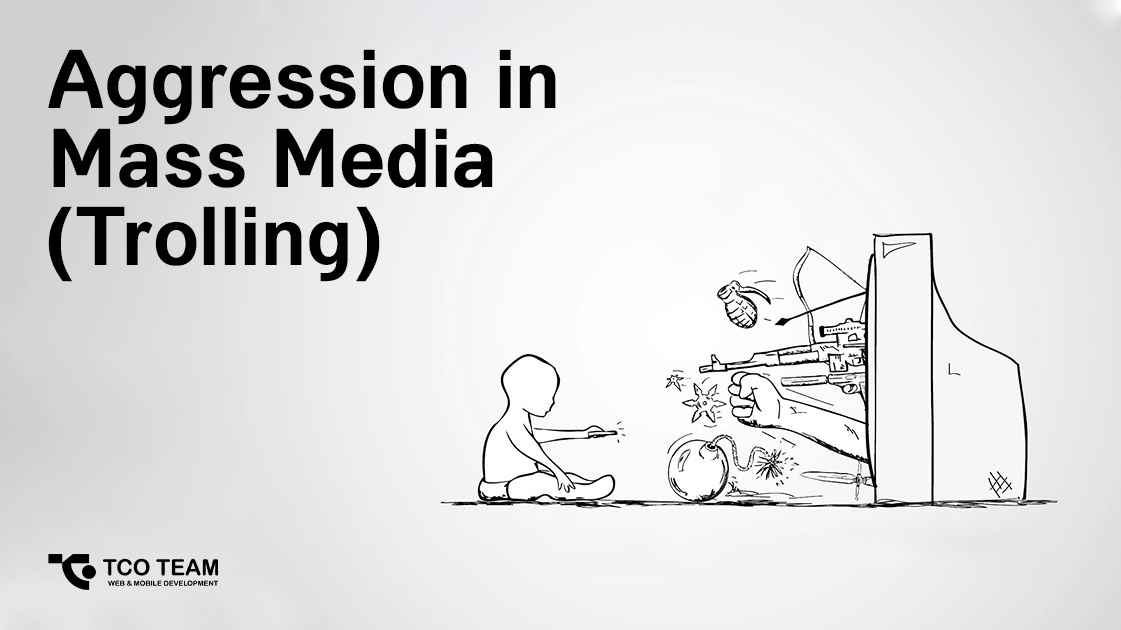Aggression In Mass Media (Trolling)

Users’ online profiles reflect not only their preferences for food, music, movies, TV shows or hobbies, but also the different political views that these users hold. Content personalization only reinforces certain political aim and informational atmosphere around the user.
Content that does not meet our political and life beliefs, we filter either on our own (unsubscribing from everything unnecessary and contrary to our views), or we resort to using a social graph or other filtering techniques and flexible content settings.
The role of editors, observers and journalists has weakened. Now, everyone can not only find hundreds of arguments in favor of a particular political position and ideology, but even create a platform on their own (with the help of communities in social networks and the blogosphere) to determine which views are “correct” and which are not.
Trolling, which has existed for as long as the Internet itself, is becoming more and more aggressive every year. Almost any discussion will sooner or later be “enriched” by those who become personal, and do it instantly and rudely. And the more we communicate on the Internet, the more powerful this phenomenon becomes.
In 2014 25-year-old Briton Sean Duffy was taken to prison for two months in prison and banned from using social networking sites for five years. The reason was his foray into the memory page of 14-year-old Natasha McBry, who had thrown herself under the train shortly before. Duffy, 25, who never saw or knew the girl, flooded the site with mocking comments and pictures. The court found that Duffy literally hunted the pages of users who died for various reasons on the Internet and published insults everywhere. Duffy never knew or met any of these guys in real life.
This was one of the first cases when the word “trolling” was mentioned in the court’s opinion. Then this behavior seemed extremely cruel, because it is difficult to imagine that someone in real life goes to the funeral of children and makes offensive jokes there. But a lot has changed since then, and jokes about dying online do not shock anyone. Trolling, which has existed for as long as the Internet itself, is becoming more and more aggressive every year. Almost any discussion will sooner or later be “enriched” by those who become personal, and do it instantly and rudely. And the more we communicate on the Internet, the more powerful this phenomenon becomes.
Since the first days of the Internet, anonymity was considered the main reason for online aggression. However, with the advent of social networks and especially Facebook, where people speak under their own names, aggression has not diminished. Psychologists began to actively study this phenomenon. What changes people to the point where they find themselves in a virtual space? Why do the social brakes that hold them back in everyday life stop working? Sociologists and psychiatrists began to say that this problem is no less important than the limitation of weapons and medical care, because we are talking about addiction, and even psychological and mental health.
But why does the Internet make us insane so easily?
There are several reasons for this.
For the First, it is easier to say nasty things in writing than orally. Now the screen has replaced the paper, but the essence remains the same – it is easier to separate oneself in writing: “my words are not my personality,” which is almost impossible in oral speech. We subconsciously do the same trick with the Internet in general: “this is not real life and not real people”.
Then conversations on the Internet do not take place in real time. The answer can be received immediately, or in an hour or a week. And this only reinforces the abstraction: “I say this to someone, somewhere, and this will be read sometime,” which removes most of the responsibility.
Thirdly, everyone can express themselves in long, uninterrupted monologues by anyone or anything. Meanwhile, in ordinary life, such communication is difficult to imagine (well, perhaps in the movies). Indeed, in an oral conversation, we always receive feedback and are simply forced to somehow react to it. By the way, not only words, but also body language, intonation considered as feedback mechanisms.
The importance is the Internet is still dominated and has no borders. There are no police, army, courts, not even models of behavior – there is no one to appeal to, except for their supporters.
And finally, participation in these “battles” gives many a feeling of victory.

